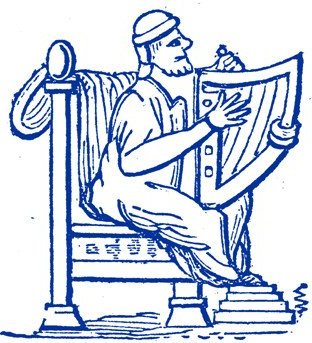
David Byers was appointed Music Producer for BBC Northern Ireland in 1977, Senior Music Producer in 1981 and eventually Chief Producer, Music and Arts in 1997.
The
range was considerable, including speech programmes for BBC Radio 4 in the
1980s based on Irish myths, fairy stories, and short stories; a prize
for BBC Radio Ulster for a folk music production from Czech Radio (with
David Hammond); Ulster Band for Radio Ulster and big band programmes
and a 12-part James Galway series for BBC Radio 2, James Galway - Encore!

Click on the soundfile below to hear David Hammond (1928-2008) singing an Irish traditional song, The Hills of Mullaghbawn, in an arrangement by David Byers for Czech Radio.
Hills of Mullaghbawn.mp3
In 1998 David Byers was executive producer for An Irish Requiem, part of the Sound Stories strand on BBC2 network
television – a 30 minute documentary following the St George’s Singers from Belfast and choirs
from Enniskillen, Carlow and Wexford, with the Ulster Orchestra,
performing Mozart’s Requiem in Wexford, Dublin and Belfast.
The conductor was Christopher Bell.
The producer/director was Clare Delargy.
The final Belfast performance coincided with the Good Friday Agreement, adding to the poignancy of a venture which commemorated all the dead of the 1798 uprising.
Click on the thumbnails below for more information.
The conductor was Christopher Bell.
The producer/director was Clare Delargy.
The final Belfast performance coincided with the Good Friday Agreement, adding to the poignancy of a venture which commemorated all the dead of the 1798 uprising.
Click on the thumbnails below for more information.
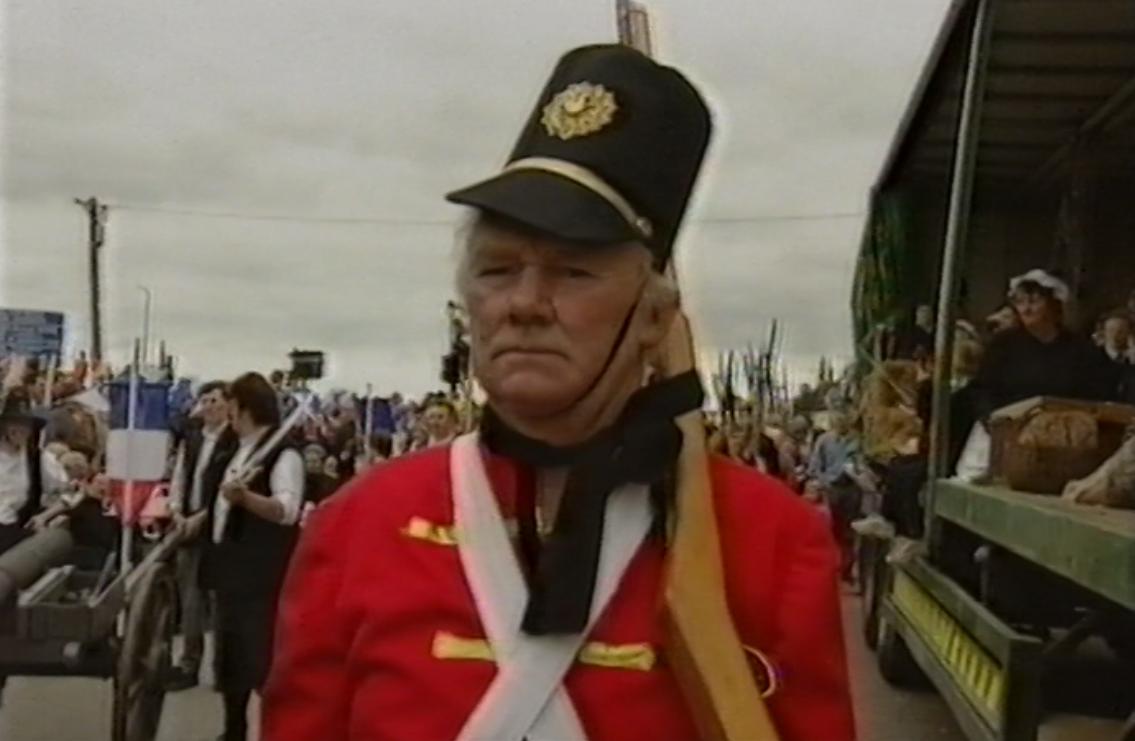
David Byers also presented a wide variety of programmes for BBC Radio Ulster
and for BBC Radio 3, ranging from Music in our Time to editions of
Composer of the Week (Borodin, Samuel Wesley, Sibelius, Hummel, Stanford, Berwald, Clementi, Saint-Saëns and Stanford again), lunchtime concerts, In Tune and Performance on 3 concert relays.
During David Byers’s tenure in charge of the BBC’s Music Department in Northern Ireland he initiated and championed the development of frequent BBC Invitation Concerts given by the Ulster Orchestra (usually in the Ulster Hall, Belfast) for BBC Radio 3 and also BBC Radio Ulster. The Orchestra also regularly contributed to BBC Radio 2, including the popular Friday Night is Music Night.
The shot-gun marriage whereby the BBC Northern Ireland Orchestra was disbanded and many of its remaining players were subsumed into the Ulster Orchestra in 1980/81 had been an uneasy one. Initially, studio recordings were fraught: complaints about the music, the orchestral parts, the lighting, the heating, the conductors … The situation only improved when the UO’s Principal Conductor Bryden Thomson agreed to conduct some of the studio sessions, thereby asserting his authority, adding his imprimatur to those studio sessions and underlining their importance for the success of continuing BBC support.
The shot-gun marriage whereby the BBC Northern Ireland Orchestra was disbanded and many of its remaining players were subsumed into the Ulster Orchestra in 1980/81 had been an uneasy one. Initially, studio recordings were fraught: complaints about the music, the orchestral parts, the lighting, the heating, the conductors … The situation only improved when the UO’s Principal Conductor Bryden Thomson agreed to conduct some of the studio sessions, thereby asserting his authority, adding his imprimatur to those studio sessions and underlining their importance for the success of continuing BBC support.
Public ‘invitation’ concerts also helped the working relationship. These free Invitation Concerts (usually in the Ulster Hall, Belfast) explored rarely-heard repertoire which wouldn’t conflict with the Orchestra’s own subscription concerts. Such Invitation Concerts were eventually also given across the season, but in 1985, David Byers began the annual series of BBC Summer Invitation Concerts which continues to this day. These were a solution to a difficult-to-fill gap in the Orchestra’s own August schedule. Over the next 17 years, the summer concerts featured seasons of infrequently-heard Berwald, Goetz, Bruckner, Sullivan, Schubert, Legends, music by women composers, Double Concertos, and much more.
Other memorable BBC Invitation Concerts included those marking Howard Ferguson’s 90th birthday (1998), celebrations of the life and music of Havelock Nelson (1996) and Joan Trimble (2003), music of Gerald Barry (2000) and the complete symphonies of Dvořák (three series of three concerts in Spring 1988). All enlivened by special and imaginative posters commissioned from Marcus Patton. Many of those posters have been collected in a fine volume, The Opera Hat of Sir Hamilton Harty, by Marcus Patton, published by Grand Piano Press, Belfast, 2003.
Other memorable BBC Invitation Concerts included those marking Howard Ferguson’s 90th birthday (1998), celebrations of the life and music of Havelock Nelson (1996) and Joan Trimble (2003), music of Gerald Barry (2000) and the complete symphonies of Dvořák (three series of three concerts in Spring 1988). All enlivened by special and imaginative posters commissioned from Marcus Patton. Many of those posters have been collected in a fine volume, The Opera Hat of Sir Hamilton Harty, by Marcus Patton, published by Grand Piano Press, Belfast, 2003.
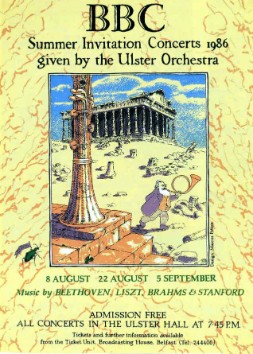
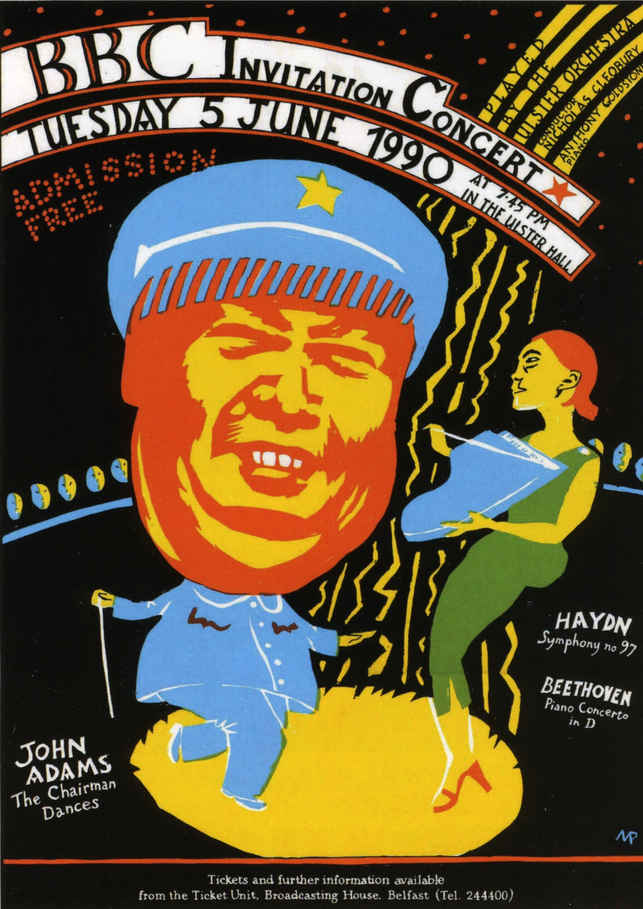
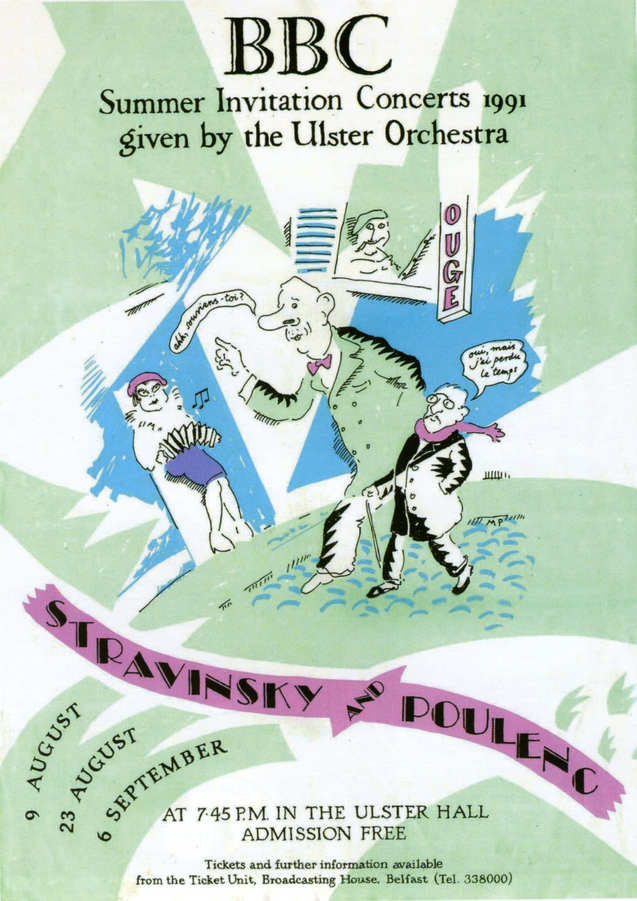
By 2000, in addition to a significant number of Ulster Orchestra
concerts for the network, the Northern Ireland region was hosting some
twenty lunchtime chamber music recitals for Radio 3 along with many similar BBC Radio Ulster
lunchtime recitals (those usually featuring musicians with a connection to the island of Ireland) – a considerable contribution to arts provision in
Northern Ireland and a tribute to DB’s colleagues in the Music Department, most notably Terry Black.
Below: Newspaper reviews of three BBC Radio Ulster Lunchtime Recitals, November 1992. Click on the thumbnails.
During David Byers’s tenure in charge of the BBC’s Music Department
in Northern Ireland (1981-2002), the region’s contributions to network
programmes included many Ulster Orchestra recordings and concerts, In
Tune, Musical Encounters, Hear and Now, Composer of the Week, Digital
Masters, programmes of traditional music, many Wexford Festival Opera relays,
chamber music recordings and relays, 18th century Dublin, etc.

Under his guidance, BBC Northern Ireland developed a distinctive artistic direction for the Ulster Orchestra’s broadcast output, helping to change the awareness of the musical establishment to British orchestral music of the past 200 years – much of which had lain dormant.
Hence the major BBC Radio 3 explorations of a wealth of 19th century music by Thomas Linley, Samuel and Charles Wesley, William Crotch, Cipriani Potter, Sterndale Bennett, Stanford, Coleridge Taylor, etc.
So much of that repertoire was ideally suited to the size of the Ulster Orchestra and helped, in the case of the Sterndale Bennett Piano Concertos, by the enthusiastic support and pianism of Malcolm Binns.
The PDF on the right has relevant reviews about Cipriani Potter and Sterndale Bennett from The Independent and The Musical Times, 1990.

|
Potter and Bennett reviews 1990.pdf Size : 2868.731 Kb Type : pdf |
Pic above:
Marcus Patton's caricature of David Byers, presented to him by his BBC
work colleagues in March 2002. © Marcus Patton.
Another vital development was the exploration of Ireland and Northern Ireland’s musical heritage (including the rediscovery of music by Joan Trimble
and Norman Hay). David Byers explored the wealth of Ulster Airs orchestrated under the editorship of Norman Hay in the late 1930s.
An important feature of these BBC years was the commissioning of new works from Irish composers (including Gerald Barry, Kevin O’Connell, Michael Alcorn, Ian Wilson, Philip Hammond, Stephen Gardiner and Elaine Agnew) and others (Adrian Thomas, Lyell Cresswell and Pawel Szymanski). These were often included in the Radio 3 orchestral concerts given as part of the annual Sonorities Festival.
David Byers also produced BBC programmes in London, including a major
series of choral and orchestral works by Thomas Linley and Samuel Wesley
with the BBC Singers and the Orchestra of St John’s, Smith Square,
organised as BBC Invitation Concerts in St. Paul’s, Knightsbridge.
In September 1997 he organised a world première performance/recording of Samuel Wesley’s Missa de Spiritu Sancto as a co-production between the BBC and RTÉ in St. Patrick’s Cathedral, Dublin, for broadcast on BBC Radio 3 and RTÉ FM3.
In September 1997 he organised a world première performance/recording of Samuel Wesley’s Missa de Spiritu Sancto as a co-production between the BBC and RTÉ in St. Patrick’s Cathedral, Dublin, for broadcast on BBC Radio 3 and RTÉ FM3.
Right: Poster by Marcus Patton for the 1992 London performance of Samuel Wesley's Ode to St Cecilia.
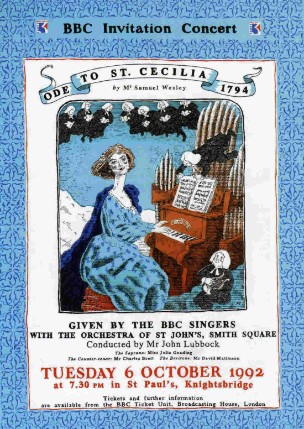
David Byers took early retirement from the BBC in March 2002 to concentrate on his own composing and writing.
In June 2002, as a freelance, he produced a week of programmes recorded in France for BBC Radio 3 with Sean Rafferty presenting ‘Paris in the Springtime’ for Morning Performance.
At the end of June 2002, David Byers was appointed Chief Executive of the Ulster Orchestra. See here.
In June 2002, as a freelance, he produced a week of programmes recorded in France for BBC Radio 3 with Sean Rafferty presenting ‘Paris in the Springtime’ for Morning Performance.
At the end of June 2002, David Byers was appointed Chief Executive of the Ulster Orchestra. See here.
Since retiring from his work with the Ulster Orchestra in September 2010, he has continued to produce occasional orchestral recordings and chamber music programmes for the BBC. He also writes the programme notes for the BBC’s Invitation Concerts.